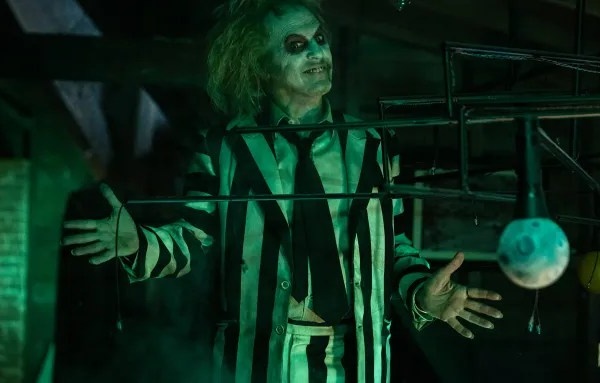
An air of mystery has permeated writer-director George Nolfi‘s “The Adjustment Bureau,” the new science fiction political thriller love story starring Matt Damon and Emily Blunt (and based on a typically paranoid 1954 short story by visionary crackpot Philip K. Dick). This is partially due to the elliptical nature of the movie’s marketing, which seemed to emphasize the retro-cool costumes more than the story itself, and because, since its completion in 2009, it has both scheduled and missed a handful of release dates.
So it is even more of a relief to report that “The Adjustment Bureau,” for all its pre-release fogginess, is a staggeringly clean, entertaining little movie that headily tackles issues like fate, love, and the nature of reality. Plus, you know, the retro-cool costumes are pretty awesome. (You’ll zoom to the nearest fedora emporium immediately after the movie is over.)

The movie starts off startlingly, with a whirlwind montage in which we get to know Damon’s character, a charismatic young (presumably) Democratic congressman named David Norris, who is running for senate. It’s edited at a furious clip and, as real life politicians start popping up, you begin to sense that Damon has borrowed at least a little bit from frequent collaborator Steven Soderbergh’s under-seen HBO series “K-Street,” which similarly blurred the line between political fact and fiction. The sequence culminates on election night, with his numbers steadily decreasing and a reality setting in: he’s going to lose.
While composing himself in the Waldorf-Asotria bathroom, its elegant marble floor reflecting his own disappointment, he bumps into a seductive stranger in the form of Emily Blunt, as Elise Sallas, a ballerina who, on a dare, has crashed a wedding in the hotel. This kind of scene is a touch tricky to pull it off, especially with such a brief amount of screen-time, but Nolfi, making his directorial debut after writing “Ocean’s Twelve” and parts of the last ‘Bourne‘ movie, crafts the sequence beautifully. The chemistry between our leads is palpable, and sort of shocking, since so many recent by-committee studio-decided romantic duos have fallen horribly flat (“The Tourist,” we’re looking in your direction). Damon is smitten and wants to be with her, and we can understand why — Blunt, for the first time in a long time, is as palpably charming as she is adorable. It’s frankly one of the most believable meet-cute scenes we’ve seen in a while and when they kiss after only talking for a few minutes, it’s entirely moving and believable. But, alas, he’s got to make a concession speech. Fate has stepped in to distance their romance
Or is it something more?
Towards the end of the opening political-stuff montage, we get glimpses of shadowy figures hanging out in the hotel, looking down at mysterious notebooks and wearing dapper suits (complete with fedoras). They have a keen interest in the congressman’s success or failure, and appear to be puppet masters for some higher design.
Years later (“The Adjustment Bureau” jumps assuredly through time in ways that are never confusing or muddled), one of those shadowy men, Mitchell (played by “The Hurt Locker” thesp Anthony Mackie) is posted outside of Damon’s apartment. It’s Mitchell’s job to keep Damon’s congressman on “schedule.” And when he fails to do so, it leads to catastrophe — not only does Damon run into Blunt again (which these men-in-fedoras do not want) but he also, later, uncovers the men at his office, coolly manipulating the fabric of reality. Damon has stumbled onto something huge. And after a threatening interrogation by Mitchell’s more openly ominous partner, Richardson (played by the always-great John Slattery), Damon agrees to keep his mouth shut and never attempt to contact Blunt.
But the heart wants what the heart wants, and for the rest of the film‘s running time, we watch as Damon tries to balance his romantic yearnings with what he understands to be the betterment of the universe. We never really grasp who these string-pullers are (angels? Aliens? Representatives of the midtown fedora emporium?), but as he delves deeper into the conspiracy, things remain clear — his goal isn’t to stop a bomb from going off or to end the tyrannical reign of some villain; it’s to get the girl, a simple, easily graspable engine which you can get behind, no matter what science fiction-y gobbledygook creeps into the storyline. Thankfully, there’s too not much of said gobbledygook. Things are kept classily mysterious, and although recent trailers have emphasized the “thriller” aspect of the story, there’s precious little of that in the actual film. There is an appropriate build, though, which culminates in what we can only describe (for fear of giving anything away) in the second greatest “door chase” sequence of all time (after “Monsters, Inc.” of course).
That said, there are some minor quibbles with the film. The third act is slightly shaky (and nearly veers into new age-y sappiness) and a requires a bit of good will from the audience to get completely behind it , and that is largely granted thanks to the charming, effective work by Damon, Blunt and Mackie (whose understated turn is a real highlight); by the time the last reel hits you are so invested in their characters, most audience members will be willing to overlook some of the goofier turns of the plot. But if the film misses completely on any front, it’s with the music. The score by Thomas Newman is clichéd and forgettable and for a film dealing with the curtain of reality being lifted, it certainly deserved something more fittingly adventurous. And we’ll not even try and figure out why Nolfi made the bone-headed decision to score a key chase sequence and emotional hook for the whole film to a flaccid remix of Peggy Lee‘s “Fever.” We’re not kidding. It’s so distracting it nearly took us out of the film.
However, inside the nerdy, science fictiony exterior of “The Adjustment Bureau,” there beats the heart of a true romantic. It both acts as an emotional tether for the audience, in case they get lost in the foggy science fiction stuff, and a truly compelling element of the plot mechanics. No matter what is going on with the well manicured men in the fedoras (look! There’s Terence Stamp!), we’re always completely intrigued and driven by the central relationship. The nimble mixture of elements is a testament to Nolfi’s skill as a writer-director, and both Matt Damon and Emily Blunt equip themselves admirably. Blunt in particular, who has always been a kind of innocuous non-entity (particularly in big budget junk like “The Wolf Man” or “Gulliver’s Travels“), feels dimensional and real and, for those who read the short story and think you know the “twist,” well, there really is none. “The Adjustment Bureau” should sit proudly next to sci-fi romances like “The Fountain” and “WALL-E” (though not as fantastical as either, and much more rooted in classic cinema love stories) as a wholly entertaining and emotional engaging tale that doesn’t let the mind overwhelm the heart. [B]





